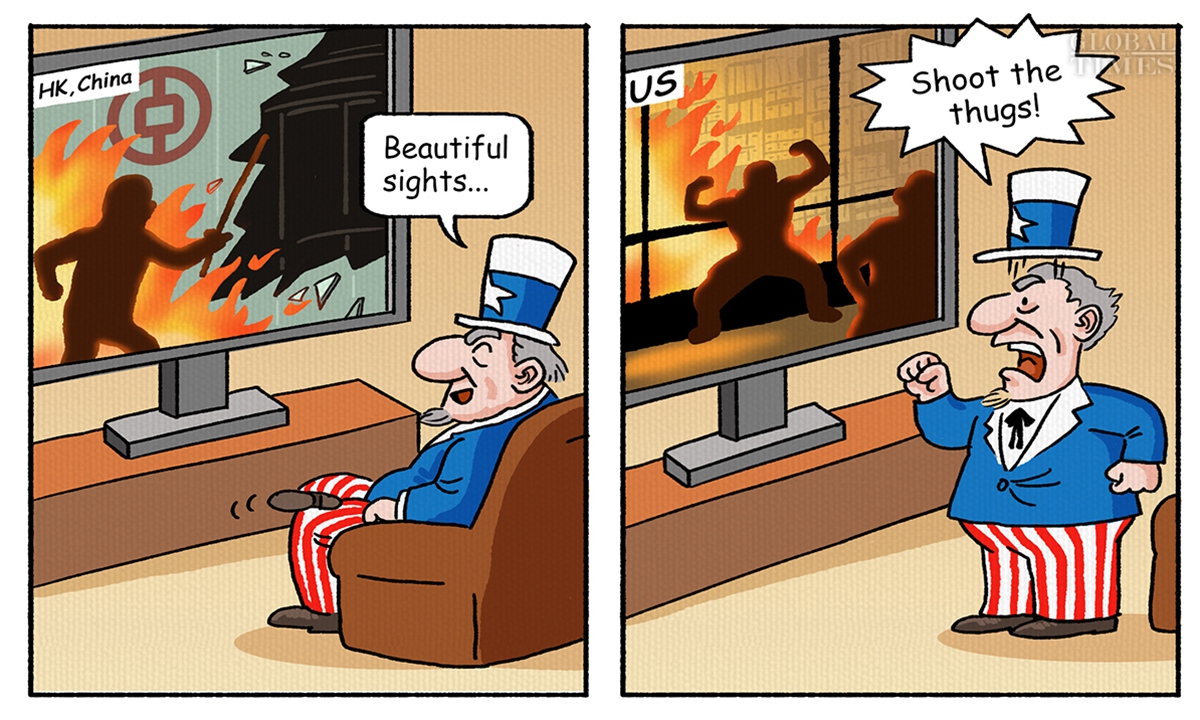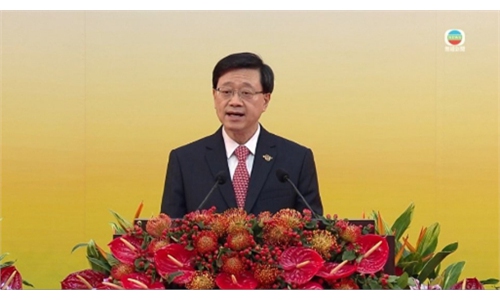
Illustration: GT
China and the US are both sovereign nations; the US has national security, and so does China. Why is it bad, in the eyes of some Westerners, to endanger the US while it is acceptable to threaten China?On Monday, Hong Kong issued HK$1 million ($127,603) bounties for eight self-exiled fugitives violating the national security law. Later that day, the US condemned Hong Kong authorities for issuing bounties linked to "democracy activists" based abroad.
Just in May, Richard Barnett, who broke into former US House Speaker Nancy Pelosi's office and put his feet on her desk during the Capitol riot in 2021, was convicted of eight counts, including felony charges of civil disorder and obstruction of an official proceeding. Two years after the Capitol riot, more than 950 have been charged in January, and the FBI "continues to seek hundreds more."
The logic of some Westerners is that these fugitives in Hong Kong are political dissidents, not ordinary criminal offenders. China believes those who caused trouble in Hong Kong and those who attacked Capitol Hill are the same kind. But in the eyes of the US, the rioters who broke into buildings on Capitol Hill violated the law, while those who caused trouble in Hong Kong are "democracy activists," said Chen Xinxin, Director of Center for Taiwan, Hong Kong and Macau Studies at Chinese Academy of Social Sciences.
US State Department spokesperson Matthew Miller said in a statement that the Hong Kong government's decision is "a dangerous precedent that threatens the human rights and fundamental freedoms of people all over the world." This is indeed a smear against the national security law for Hong Kong.
Those wanted by the Hong Kong police are the main culprit of the chaos in Hong Kong from 2019 to 2020. After fleeing overseas, the accused have been recklessly engaging in anti-China and disruptive activities, while the US and other Western countries are ignoring the facts, smearing China and openly sheltering the wanted criminals.
Some countries tend to hinder China due to political reasons, especially the US and its allies. However, the validity of the law itself is still legal, and the crime will not disappear even when the criminals flee to other countries. Such stigmatization of national security law is theoretically and jurisprudentially untenable.
Actually, it is a very common practice to globally chase those who violate national security laws. So criticizing China over this matter is unreasonable and disrespectful to China's sovereignty and stigmatization of the national security law, which is essentially the politicization of China's legal issues and the interference in China's internal affairs, the expert told the Global Times.
In response to Hong Kong's accusations against the fugitives, UK foreign secretary James Cleverly also said Britain would "not tolerate any attempts by China to intimidate and silence individuals in the UK and overseas."
One of the intentions of the US and Britain is to toss China and contain it by any means possible amid the China-US competition. In particular, some politicians abroad hope to cause more trouble in Hong Kong as a way to gain political capital.
This year is the third anniversary of the enforcement of the national security law for Hong Kong. Hong Kong's national security forces have so far arrested 260 people. As John Lee, chief executive of the Hong Kong Special Administrative Region, said on Tuesday, the only way for the activists to "end their destiny of being an abscondee who will be pursued for life is to surrender."
"The number of arrested proves it is right to enforce the law. It also shows the deep and wide impacts of the law in Hong Kong. Without this law, these hundreds of people would have gone unpunished. This demonstrates the effectiveness of the law," an expert said.

